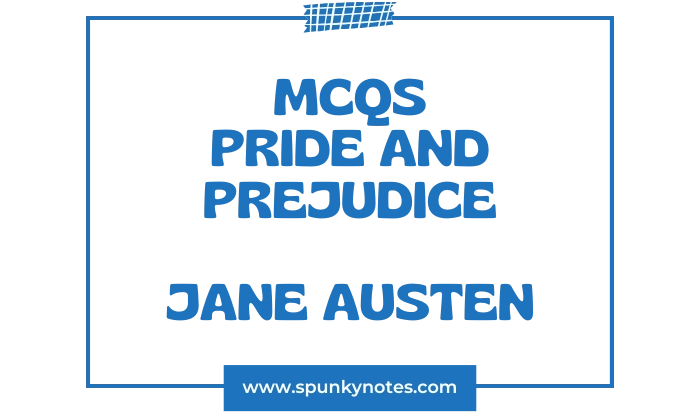

Estimated Reading Time: 24 min
Pride and Prejudice MCQs
Places
Where do the Bennet family primarily reside?
A. Meryton
B. Netherfield Park
C. Rosings Park
D. Longbourn
In which village is the Bennet family’s home located?
A. Meryton
B. Longbourn
C. Lambton
D. Hunsford
What type of property is Mr. Bennet’s estate, Longbourn?
A. A freehold estate passing to his eldest daughter.
B. A small cottage with a leasehold.
C. An entailed estate, passing to a distant male relation.
D. A large estate inherited through his wife’s family.
How far is the village of Longbourn from Meryton?
A. Two miles
B. Half a mile
C. Three miles
D. One mile
Where do Sir William and Lady Lucas live?
A. Meryton
B. Rosings Park
C. Longbourn
D. Lucas Lodge
How is Lucas Lodge situated in relation to Meryton?
A. It is in the centre of Meryton.
B. It is ten miles from Meryton.
C. It is a short walk from Longbourn.
D. It is about a mile from Meryton.
What is the name of the estate Mr. Bingley rents?
A. Pemberley
B. Longbourn
C. Rosings Park
D. Netherfield Park
Where did the Bingleys come from before taking Netherfield?
A. Meryton
B. Derbyshire
C. Kent
D. London
Mr. Darcy’s estate is in which county?
A. Hertfordshire
B. Kent
C. London
D. Derbyshire
What is the name of Mr. Darcy’s estate?
A. Rosings
B. Pemberley
C. Netherfield
D. Longbourn
11. In what type of area is Pemberley situated?
A. Hilly, woody country, five miles from Lambton.
B. A bustling city.
C. A flat, agricultural plain.
D. A coastal region.
Where is Mr. Collins’s parish located?
A. Meryton
B. Longbourn
C. London
D. Hunsford, Kent
What is the name of Lady Catherine de Bourgh’s residence?
A. Netherfield Park
B. Pemberley
C. Rosings Park
D. Lucas Lodge
How close is Mr. Collins’s parsonage to Rosings Park?
A. It is several miles away.
B. The garden is separated only by a lane from the park.
C. It is within the gates of Rosings Park.
D. It is in a different county.
Where do the Gardiners reside?
A. Brighton
B. Meryton
C. Hunsford
D. Gracechurch Street, London
How is Gracechurch Street characterized?
A. A fashionable area of London.
B. A rural market town.
C. A quiet seaside resort.
D. An unfashionable, commercial London neighbourhood.
Where do Lydia and Wickham ultimately settle after their marriage?
A. London
B. Meryton
C. Newcastle
D. Longbourn
In what county is Hunsford located?
A. Derbyshire
B. Sussex
C. Hertfordshire
D. Kent
Where did Lydia suggest was a good place “to get husbands”?
A. Brighton
B. London
C. Meryton
D. Hunsford
Which of the following families is not originally from Hertfordshire?
A. The Philipses
B. The Bingleys
C. The Bennets
D. The Lucases
What was the name of Mrs. Gardiner’s “former residence” visited during the northern tour?
A. Pemberley
B. Meryton
C. Rosings Park
D. Lambton
What is the entailment on the Longbourn estate?
A. It must pass only to female heirs.
B. It must pass to a specified male heir, not the daughters.
C. It has a heavy financial burden.
D. It cannot be sold.
What is the occupation of the Bennet sisters’ uncle, Mr. Philips?
A. An attorney
B. A gentleman farmer
C. A military officer
D. A clergyman
Where did the Gardiners leave their children while they went on tour?
A. London
B. Pemberley
C. Lambton
D. Longbourn
What is the name of the town where the militia regiment was headquartered?
A. Longbourn
B. Brighton
C. Hunsford
D. Meryton
1. What universally acknowledged truth opens the novel?
A. A single man must secure a great estate.
B. A single man in possession of a good fortune must be in want of a wife.
C. Happiness in marriage is entirely a matter of chance.
D. A well-bred young lady must seek an establishment.
2. What is the name of the estate rented by Mr. Bingley?
A. Lucas Lodge
B. Longbourn
C. Pemberley
D. Netherfield Park
3. What is Mr. Bingley’s reported annual income?
A. Ten thousand a year
B. Four or five thousand a year
C. One thousand pounds
D. Two thousand a year
4. According to the narrator, what was the principal “business” of Mrs. Bennet’s life?
A. Reading and moralizing.
B. Securing her own nerves.
C. Getting her daughters married.
D. Finding suitable properties.
5. Mr. Bennet believes that Elizabeth (Lizzy) possesses more of what quality than her sisters?
A. Beauty
B. Good-humour
C. Quickness
D. Accomplishment
6. Who was among the earliest visitors to wait on Mr. Bingley after he arrived?
A. Mrs. Long
B. Lady Lucas
C. Elizabeth
D. Mr. Bennet
7. How long did Mr. Bingley sit with Mr. Bennet during his return visit to Longbourn?
A. Half an hour
B. An hour
C. About ten minutes
D. A fortnight
8. What is Mr. Darcy’s reported annual income?
A. Four or five thousand a year
B. Ten thousand a-year
C. Two thousand a year
D. Fifty thousand pounds
9. Why did Mr. Darcy generally incur the disgust of the company at the Meryton assembly?
A. He was clumsy and awkward.
B. He insulted Mrs. Bennet.
C. He was discovered to be proud and above his company.
D. He spoke ill of the neighbourhood.
10. When Mr. Darcy declined dancing with Elizabeth, he commented that she was “tolerable,” but lacked what?
A. Money to tempt him.
B. Beauty enough to tempt him.
C. Sufficient modesty.
D. Good breeding.
11. According to Elizabeth, Jane is admirable because she never sees a fault in anybody and is honestly blind to what?
A. The superiority of rank.
B. The follies and nonsense of others.
C. The value of true attachment.
D. The necessity of wealth.
12. What was the former source of the Bingley siblings’ family fortune?
A. Inherited estates
B. Trade
C. Government patronage
D. Legal practice
13. What characteristics endeared Mr. Bingley to Mr. Darcy, despite their differences?
A. His accomplishments and wealth.
B. His fine figure and handsome features.
C. His quick parts and sarcastic humour.
D. His easiness, openness, and ductility of temper.
14. How did Sir William Lucas attain the honour of knighthood?
A. He performed exceptional military service.
B. He inherited the title from his father.
C. By an address to the king during his mayoralty.
D. By successfully investing in London trade.
15. What specific feature of Elizabeth’s face did Mr. Darcy first begin to notice with admiration?
A. Her fine complexion.
B. Her light and pleasing figure.
C. The beautiful expression of her dark eyes.
D. Her easy playfulness.
16. How did Jane travel to Netherfield, resulting in her illness?
A. By chaise and four.
B. In the family coach.
C. On horseback.
D. She walked.
17. How far did Elizabeth walk to reach Netherfield to attend to her sick sister?
A. Two miles.
B. Three miles.
C. Four miles.
D. Half a mile.
18. What was Mr. Hurst’s main activity in life?
A. Writing letters.
B. To eat, drink, and play at cards.
C. Riding and shooting.
D. Discussing literature.
19. What low connection did Mr. Darcy specifically mention lessened the Bennets’ chance of marrying well?
A. Their relation who was a merchant.
B. Their uncle who lived near Cheapside.
C. Mr. Bennet’s odd character.
D. Mrs. Bennet’s attorney father.
20. According to Mr. Darcy, what substantial quality must an accomplished woman add to her musical and artistic skills?
A. Greater fashion.
B. A cheerful manner.
C. Improvement of her mind by extensive reading.
D. High family connections.
21. What did Elizabeth accuse Mr. Darcy of doing when they discussed character flaws?
A. Excessive vanity.
B. Unappeasable resentment.
C. Wilfully misunderstanding people.
D. Having no proper feeling.
22. Who is Mr. Collins’s patroness?
A. Miss Darcy
B. Mrs. Phillips
C. Miss Bingley
D. Lady Catherine de Bourgh
23. What book did Mr. Collins choose to read aloud to the Bennet ladies, offending Lydia?
A. A novel from a circulating library.
B. Fordyce’s Sermons.
C. A folio on theology.
D. A book of poetry.
24. Which Bennet daughter did Mr. Collins initially choose for his wife?
A. Elizabeth
B. Jane
C. Mary
D. Lydia
25. What happened when Mr. Darcy and Mr. Wickham suddenly encountered each other in Meryton?
A. They immediately shook hands.
B. Both changed colour.
C. Darcy was pleased and Wickham was embarrassed.
D. They spoke civilly to one another.
26. What was Mr. Wickham’s intended profession, which he claimed to have lost due to Mr. Darcy?
A. Military officer.
B. Lawyer.
C. Clergyman (the church).
D. Estate manager.
27. Who attempted to dissuade Mr. Collins from introducing himself to Mr. Darcy at the Netherfield ball?
A. Jane
B. Lady Catherine
C. Mrs. Bennet
D. Elizabeth
28. What does Mr. Bennet tell Elizabeth he will do if she does not marry Mr. Collins?
A. Turn her out of the house.
B. Disinherit her.
C. Never see her again.
D. Send her to live with the Gardiners.
29. To whom did Mr. Collins immediately transfer his attentions after Elizabeth refused him?
A. Jane Bennet
B. Maria Lucas
C. Mrs. Bennet
D. Miss Lucas (Charlotte)
30. Charlotte Lucas chose to marry Mr. Collins primarily for what reason?
A. She believed she could make him agreeable.
B. She was violently in love with him.
C. To secure a comfortable establishment/preservative from want.
D. To inherit Longbourn sooner.
31. When Miss Bingley wrote to Jane about Mr. Bingley’s departure for London, what relative of Mr. Darcy’s did she praise extensively?
A. Lady Catherine de Bourgh
B. Colonel Fitzwilliam
C. Mrs. Hurst
D. Miss Darcy (Georgiana)
32. What specific location did Mrs. Gardiner suggest visiting during the summer tour?
A. Brighton
B. London
C. The Lakes
D. Hertfordshire
33. When Elizabeth visited Charlotte at Hunsford, she observed that Mr. Collins was engaged in what specific occupation for enjoyment?
A. Playing quadrille.
B. Composing sermons.
C. Working in his garden.
D. Reading serious books.
34. Lady Catherine strongly criticized the Bennet girls’ upbringing, especially regarding their lack of what?
A. Musical talent.
B. A governess.
C. Drawing skills.
D. Good breeding.
35. How did Elizabeth’s friend, Charlotte, rationalize keeping Mr. Collins out of her sitting room during the mornings?
A. He was too studious to be disturbed.
B. He would have been much less in his own apartment if she sat in a lively room.
C. Lady Catherine forbade him from interfering with the ladies.
D. She preferred solitude for reflection.
36. What accidental piece of information did Colonel Fitzwilliam reveal to Elizabeth that confirmed Darcy’s interference in Jane’s life?
A. That Darcy admired Elizabeth’s eyes.
B. That Darcy intended to marry Miss De Bourgh.
C. That Darcy had recently saved a friend from an imprudent marriage.
D. That Darcy hated Wickham deeply.
37. What were the two main charges Elizabeth levied against Mr. Darcy when she rejected his proposal?
A. His arrogance and his pride.
B. Ruining Jane’s happiness and ill-treatment of Wickham.
C. His lack of civility and his bad temper.
D. His contempt for her family and his high income.
38. What reason did Mr. Darcy give for initially struggling against his inclination to love Elizabeth?
A. Her ill-humour and quick temper.
B. Her friendship with Wickham.
C. Her inferiority of connections/family obstacles.
D. Her lack of fortune.
39. What did Elizabeth realize she had been guilty of, making her feel “blind, partial, prejudiced, absurd”?
A. Jealousy, not love, of Jane.
B. Vanity, not love, in her partiality for Wickham and prejudice against Darcy.
C. Pride, not vanity, in her self-worth.
D. Disdain for her own family.
40. When Elizabeth inquired about the family at Pemberley, what welcome news did the chambermaid give her?
A. That Mr. Darcy was seeking her.
B. That Mr. Darcy was unmarried.
C. That the family were not down for the summer.
D. That the grounds were beautiful.
41. What word did the housekeeper, Mrs. Reynolds, use to describe Mr. Darcy when she was praising him to Elizabeth?
A. Clever
B. Sweetest-tempered
C. Handsome
D. Proud
42. Who accompanied Mr. Darcy when he came to visit Elizabeth at the inn in Lambton?
A. Colonel Fitzwilliam
B. Miss Bingley
C. Mr. Bingley
D. Miss Darcy
43. What catastrophic event did Jane’s letters reveal to Elizabeth?
A. Mr. Bingley was marrying Miss Darcy.
B. Mr. Bennet had lost his estate.
C. Lydia had eloped with Mr. Wickham.
D. Elizabeth’s refusal of Darcy was public knowledge.
44. Which London suburb were Lydia and Wickham traced to before they took a hackney-coach and disappeared?
A. Meryton
B. Clapham
C. Brighton
D. Gracechurch Street
45. Who did Mr. Bennet believe would fight Wickham and be killed after the elopement?
A. Mr. Gardiner
B. Colonel Forster
C. Himself
D. Mr. Darcy
46. Who was responsible for settling Wickham’s debts and forcing him to marry Lydia?
A. Mr. Bennet
B. Mr. Gardiner
C. Colonel Forster
D. Mr. Darcy (The primary negotiator and payer was Darcy, though the Bennet family was told it was Mr. Gardiner).
47. After the wedding, what new regiment and location was Wickham sent to?
A. Colonel Forster’s regiment in Brighton.
B. The -shire militia in Meryton.
C. The Regulars, quartered in the north (Newcastle).
D. A post at court.
48. What fact did Lydia accidentally reveal about her wedding, causing Elizabeth great astonishment?
A. That she wore a vulgar dress.
B. That her mother attended.
C. That Mr. Darcy was present.
D. That Wickham was still in debt.
49. What key factor, according to Mr. Darcy, encouraged him to follow Lydia and fix her marriage?
A. His wish to repay Mr. Bennet.
B. His sense of duty to Mr. Bingley.
C. The wish of giving happiness to Elizabeth.
D. His fear of Lady Catherine’s anger.
50. When Elizabeth confessed her change of heart, she humorously suggested she must date her love for Darcy from when?
A. His payment of Wickham’s debts.
B. Her first seeing his beautiful grounds at Pemberley.
C. His first proposal in Kent.
D. Lady Catherine’s interference.
Brief Overview
Pride and Prejudice is a classic novel by Jane Austen. It is a romantic comedy centered on the lives of the five Bennet sisters in rural England. The central theme is the importance of overcoming personal biases to find true love and happiness.
The story focuses on Elizabeth Bennet, the second eldest, who is intelligent and witty. Her mother, Mrs. Bennet, is desperate to marry off all her daughters to secure their financial futures.
The arrival of two wealthy bachelors creates excitement: Mr. Bingley and his aloof, proud friend, Mr. Darcy. Bingley quickly falls for the eldest sister, Jane Bennet.
Elizabeth immediately forms a prejudice against Mr. Darcy, finding him arrogant and rude. Darcy, despite himself, is drawn to Elizabeth’s spirit.
Darcy proposes, but Elizabeth angrily rejects him, accusing him of ruining Jane’s relationship with Bingley and mistreating a soldier named Wickham.
Darcy later gives Elizabeth a letter explaining his actions. This letter forces Elizabeth to realize she judged him too quickly. She understands her own prejudice and the true character of others. Darcy, in turn, overcomes his social pride.
The novel ends with the happy marriages of both Jane and Elizabeth, proving that love can triumph over social class and personal errors.


